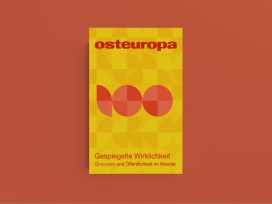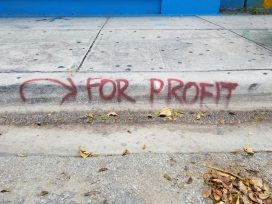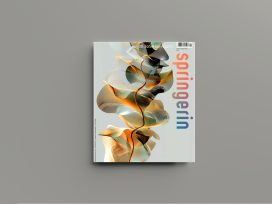So the 2012 European Capital of Culture in Maribor is happening. It is by now already clear that there will be no big disgrace, nor major improvements for the infrastructure of the city, nor a major break in the mentality of the city. There will be no disgrace because the program is running reasonably successfully; there will be no infrastructural gains because the crisis has eliminated any money for them; and there will be no break in mentality since cultural activity, whatever it may be, simply cannot achieve that. Otherwise, the number of visitors in the city has visibly increased, especially of foreign tourists, and this will bring in more income for the local economy, which will be the principal medium term economic effect.
Financing European cultural journals
Like other types of cultural organization reliant on public funds, cultural journals throughout Europe have felt the impact of recession. In addition to funding cuts, journals are also having to negotiate the upheavals taking place in the print sector.
Through a European survey of financing for cultural journals, Eurozine takes stock of the situation of the network, in order to communicate its experiences internally and to others who hold a stake in European cultural policy today. [more]
Read the statements here:
Varlik, Turkey
Ord&Bild and Glänta, Sweden
Vikerkaar, Estonia
Wespennest, Austria
Sodobnost, Slovenia
Host, Czech Republic
Res Publica Nowa, Poland
Mute, UK
Intellectum, Greece
Blätter für deutsche und internationale Politik, Germany
But despite this the city is languishing. The purchasing power of the population is waning and the city centre shows signs of life only twice a month: the day the state pays out pensions and the day it pays out social welfare and grants. The city has been unable to recover from the end of the 1980s and beginning of the 1990s, when almost all its major industries, which had been producing primarily for the Yugoslav market and the Third World, collapsed. The local authorities have tried to revive the city through various projects (one of which is the ECC) and to attract European and national funding, but in all of these projects it must also contribute its own resources. In an economically impoverished city this cannot be sustained indefinitely, and Maribor is heavily in debt. The ECC will not help the city’s residents to make a living, but it does have an impact on the livelihoods of cultural workers: the Public Institute Maribor 2012, which administers the ECC, consumes additional funding for culture and makes decisions about its allocation.
 The problem of culture in a small national space such as Slovenia is the small size of the market; this means that culture cannot survive on the market alone and needs national or local funding for its existence. Culture cannot support a city that lacks a strong economy of its own; likewise it cannot survive there if the city is not prosperous enough to support it. In media reporting on cultural events, the question of the survival of culture during the ECC and after it is overlooked. Yet for some years there has been a struggle among cultural workers for the funding which was promised for the ECC. It is necessary to look at the story of this in a somewhat different light.
The problem of culture in a small national space such as Slovenia is the small size of the market; this means that culture cannot survive on the market alone and needs national or local funding for its existence. Culture cannot support a city that lacks a strong economy of its own; likewise it cannot survive there if the city is not prosperous enough to support it. In media reporting on cultural events, the question of the survival of culture during the ECC and after it is overlooked. Yet for some years there has been a struggle among cultural workers for the funding which was promised for the ECC. It is necessary to look at the story of this in a somewhat different light.
Things started out well: the Kibla Center, which put together Maribor’s application, first defeated the capital of Ljubljana in a domestic battle and then successfully defended their proposal in Brussels. Then local politics removed Kibla and the battle for positions and money began. And in the same way that the nominees were changed, so were priorities in investments. At first things looked good for Vladimir Rukavina, the best known cultural manager in the city and the capable director of the National House Cultural Events Centre and the summer Lent Festival. At that time, the top investment priority was a new concert hall, though it must be noted that the city already has a renovated old concert hall, a large opera hall in the theatre, and many smaller concert venues. When it finally became clear that Maribor had been selected and that major funding would be made available, theatre director Tomaz Pandur suddenly appeared on the scene after a long absence and, in the style of a great artist returning home, immediately became the mayor’s favoured choice for heading up the ECC. Pandur’s idea for a new theatre on the right bank of the Drava River – the MAKS – then became the investment priority. In which it should not be forgotten that Maribor already has the largest cultural institution in the country, the Slovenian National Theatre, along with the Drama, Opera, and Ballet and many theatre halls, a new Puppet Theatre and sufficient smaller stages. What the city was truly in need of, a new art gallery able to host exhibitions and provide permanent cultural amenities during the ECC year and afterwards, was repeatedly sidelined and, in a sort of concocted compromise, relegated to an uncertain future. The money for MAKS was then finally swept away by the economic crisis and the protests against Pandur became increasingly vociferous. And he left. The final choice of national and local politics for program director of Maribor 2012 was Mitja Cander, editor of the Student Publishing House in Ljubljana, who brought his team with him to Maribor.
Time and money had been lost on investment plans and the programmatic basis for the ECC remained in disarray. Things got bogged down further when it became necessary to start narrowing down the too-widely conceived Kibla proposal. In the end, Cander’s team, running out of time, opted to hold numerous smaller events. This kind of program, realized less funding than had been originally promised, was of course a good decision and is revitalizing activity in the city. But rather than inventing anything new, it is repeating a basic concept that has been around in the city for a long time, first introduced by the popular Lent Festival. The sheer number of events in the ECC program gives the impression of abundance and creative energy; but at the same time it blurs a great deal, since it is impossible to follow the whole program, let alone evaluate it critically.
The scattered nature of the program is also a consequence of the uncertainties and postponements. Time and motivation ran out for developing a connecting thread that would truly touch the heart of the city, which over the course of its history has already experienced quite a few losses and changes of identity and ups and downs. While individual events organized by local artists – for example the exhibition on Maribor Germans and the documentary performance “Was it Maribor?” (about the former car factory) – have been very well received, the absence of a deeper concept of what it means to be a capital of culture meant that Maribor missed an opportunity to attract western Europeans by drawing on its socialist, industrial past, in the style of “How we survived communism and even laughed”. To put it another way: just as Slovenian politics is at a loss for a fundamental concept on what to do with the country in a crisis, so the ECC also missed its opportunity.
The team now in charge of the ECC is a literary group made up of people from the generation entering the Slovene cultural space in their student years in the 1990s, in fact with the help of Dialogi. By founding the Student Publishing House in Ljubljana they managed to create a livelihood for themselves at a time when the large publishing houses were no longer hiring editors. Many students in Slovenia did at odd jobs during their studies, and a commission from these jobs went to student organizations which then founded companies. The Student Publishing House also came into being by means of this curiosity, later developing into the biggest publisher of modern Slovenian literature and one of the major recipients of state subsidies for this purpose. In the same year that Slovenian publishing was hit by crisis, the group found the opportunity to work in Maribor.
The cultural production taking place in the framework of the ECC, with the help of national and local funding, currently provided a haven for a considerable number of artists and organizers. This aspect of the ECC is entirely overlooked in the public eye. At a time when the government is cutting back drastically on public funding for culture, the ECC is an island offering refuge to artists for at least one year. But not to all of them. The ECC has already claimed its first victims among Maribor cultural workers. Many were concerned over what would become of culture in Maribor after the ECC, particularly the culture that had existed here before. We did not, however, expect the first victims to fall this year already. These victims are Maribor publishing houses that carry out programs in the public interest – among them Dialogi. It is now an open secret that out of the 18 million Euros of municipal funds made available for the ECC, exactly 28,000 was lacking, and that municipal politics decided to take these from books and magazines. For publishing houses, this is a bitter reminder of how (un)important we are to local politics. Although the mayor later invalidated that transfer, as I write this Dialogi is still without this year’s municipal funding and in complete uncertainty over what it will receive in the future.
The Maribor 2012 office is already preparing a plan as to what its employees will be doing after 2012. This means that the group that came to Maribor to realize this year’s ECC program will be attempting to secure its existence here in future, too. Another applicant will therefore be looking for funding from the already impoverished municipal coffers. Since public institutes clearly take priority in the eyes of municipal politics, there will be less and less funding available for programs and projects of so-called “independent” culture. And since the municipality also no longer has a long-term program for the development of culture (the old one expired), there is ample space for fishing in troubled waters. Not all the existing cultural programs in the city will survive, and this will also need to be noted as one of the serious consequences of the ECC.
At the beginning of the summer the local newspaper Vecer reported that, due to the cutbacks in public funding for the purchase of new books, the Maribor Library would be running fundraising campaigns in order to fund its activities, inviting respected individuals to help. Culture in Slovenia has finally been divided into those who have a place at the trough and those who must be rescued by charity. Among the first to respond was the program director of the ECC. In their euphoria over all that is happening as part of the European Capital of Culture, Maribor’s cultural workers seem not even to be aware of what is happening to them.







